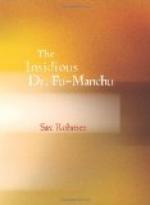The breeze was growing higher, and pungent odor-waves from the damp shrubbery, bearing, too, the oppressive sweetness of the creeping plant, swept constantly through the open window. Inspector Weymouth carefully relighted his cigar.
“I’m with you this far, Mr. Smith,” he said. “Strozza, knowing Sir Lionel to be absent, locked himself in here to rifle the mummy case, for Croxted, entering by way of the window, found the key on the inside. Strozza didn’t know that the Chinaman was hidden in the conservatory—”
“And Kwee did not dare to show himself, because he too was there for some mysterious reason of his own,” interrupted Smith.
“Having got the lid off, something,—somebody—”
“Suppose we say the mummy?”
Weymouth laughed uneasily.
“Well, sir, something that vanished from a locked room without opening the door or the window killed Strozza.”
“And something which, having killed Strozza, next killed the Chinaman, apparently without troubling to open the door behind which he lay concealed,” Smith continued. “For once in a way, Inspector, Dr. Fu-Manchu has employed an ally which even his giant will was incapable entirely to subjugate. What blind force—what terrific agent of death—had he confined in that sarcophagus!”
“You think this is the work of Fu-Manchu?” I said. “If you are correct, his power indeed is more than human.”
Something in my voice, I suppose, brought Smith right about. He surveyed me curiously.
“Can you doubt it? The presence of a concealed Chinaman surely is sufficient. Kwee, I feel assured, was one of the murder group, though probably he had only recently entered that mysterious service. He is unarmed, or I should feel disposed to think that his part was to assassinate Sir Lionel whilst, unsuspecting the presence of a hidden enemy, he was at work here. Strozza’s opening the sarcophagus clearly spoiled the scheme.”
“And led to the death—”
“Of a servant of Fu-Manchu. Yes. I am at a loss to account for that.”
“Do you think that the sarcophagus entered into the scheme, Smith?”
My friend looked at me in evident perplexity.
“You mean that its arrival at the time when a creature of the Doctor— Kwee—was concealed here, may have been a coincidence?”
I nodded; and Smith bent over the sarcophagus, curiously examining the garish paintings with which it was decorated inside and out. It lay sideways upon the floor, and seizing it by its edge, he turned it over.
“Heavy,” he muttered; “but Strozza must have capsized it as he fell. He would not have laid it on its side to remove the lid. Hallo!”
He bent farther forward, catching at a piece of twine, and out of the mummy case pulled a rubber stopper or “cork.”
“This was stuck in a hole level with the floor of the thing,” he said. “Ugh! it has a disgusting smell.”




